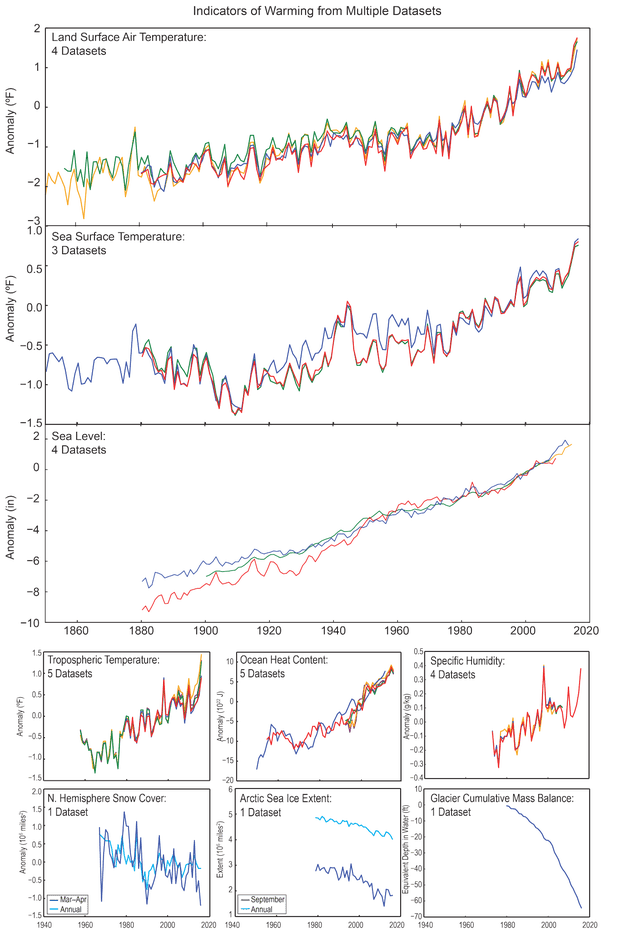US government report finds steady and persistent global warming
Posted on 6 December 2017 by John Abraham
The US Global Change Research Program recently released a Climate Science Special Report. It is clearly written – an authoritative summary of the science, and easy to understand.
The first main chapter deals with changes to the climate and focuses much attention on global temperatures. When most people think of climate change, they think of the global temperature – specifically the temperature of the air a few meters above the Earth surface. There are other (better) ways to measure climate change such as heat absorbed by the oceans, melting ice, sea level rise, or others. But the iconic measurement most people think of are these air temperatures, shown in the top frame of the figure below.

The top chart is shown as a temperature “anomaly,” which means a departure from normal. Right now the anomaly is nearly 2°F, meaning that we have warmed 2°F from what the normal temperature should be. The graph shows four datasets, so it doesn’t matter whose temperature data we use; the results are the same. Global land-air temperatures have been rising pretty steadily since approximately 1960.
The next graph shows ocean surface temperatures. They too are rising and have been increasing for a number of decades. Sea surface temperatures are determined from satellites, from sensors on ships, and from floating instruments spread across the ocean. Over the decades, we have obtained better coverage of the ocean. Decisions are made from different research teams on how to combine measurements from different instruments and how to interpolate between measurement locations. But regardless of the decisions made, we see the temperatures rise.
The third graph shows sea level. It has been rising for more than a century. Sea level rise is a favorite measurement for scientists because it integrates the heat added to the Earth’s climate. The heat ends up in the ocean waters and causes the waters to become less dense. The lower density of water causes much of the sea level rise in the graph.
The center two images in the lower rows respectively show the amount of heat in the ocean and changes to Arctic ice. We see that ocean heat content is increasing and the amount of ice is decreasing. The lower right image represents the mass of the world’s glaciers. The decrease in glacier mass as glaciers warm, melt, and flow to the oceans is shockingly fast.
Take some time to think about these climate signals. The figure shows nine different measurements, and all of them are consistent with a warming climate. So, next time someone tries to argue that we don’t really know if climate change is occurring, just remind them that all the signals show a global warming.































 Arguments
Arguments






























Another useful study. Reading the comments after the article, we have many denialist claims we have heard many times before, all unsupported by any sources, and rebuttals from people quoting actual research sources. It's so sad and frustrating this is all still needed, and it's so time consuming.
No doubt some climate denialists simply have inadequate knowledge and can be persuaded and informed, but I think the problem is largely ideological and political, and research supports this as follows.
According to this article here we are very fixed minded on politically charged issues, as climate change has become. We takes politics very personally apparently. They say challenge is for us to depersonalise and rationalise the issues.
This research article here discusses research on what changes peoples minds. Its really useful, and full of surprises.
Has anyone done a comparison with the latest data and Hansen’s Congressional testimony? I would love that, last ones I’ve seen were from here, maybe 2014?
Even politicians who realize what is happening will spout denialism if that is demanded by their sponsors. The one ring that controls them all is money in politics. The cost of the present system is so huge, so pervasive that it would be far better if politicians were supported from the public purse. Getting vested-interest money out of politics is the one move that would give us a chance.
"Getting vested-interest money out of politics is the one move that would give us a chance."
Yes absolutely.
Wikipedia has interesting article on publicly funded elections, and examples of countries using this, although the extent is limited:
en.wikipedia.org/wiki/Publicly_funded_elections
It seems such a small price for us to pay to clean up politics and ensure politicians don't become captured by hidden lobby groups. Of course the opponents of public funding will argue that a wide range of groups contribute to election campaigns so it allegedly "evens out" but it only takes one wealthy group to capture key politicians, to have a disproportionate and damaging influence, IMO and the fossil fuel industry is very wealthy.
And on a related matter, you only have to read the history of lobbying against environmental legislation to be quite shocked about what goes on behind the scenes, and how dirty the game often is.
However things may be slow to change in the USA for reasons to do with constitutional guarantees on freedom, and a tendency to take things simplistically in this regard. It may be that philanthropists concerned about climate change should fund politicians campaigns as much as they possibly can. It's not idea solution, but seems the only viable option in America right now, and would dilute the influence of the fossil fuel groups and libertarian business donors.
It's also a moral question. Politicians are paid out of the public purse in terms of their salaries, and should be thinking of the public interest as a whole.